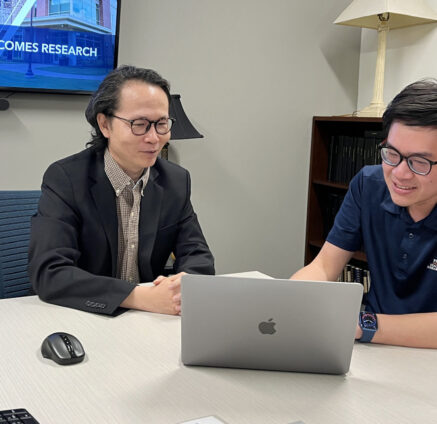Frontier Award Study Empowers Patients to Confidently Engage in Value Assessment
September 29, 2025PhRMA Foundation awardee Surachat “Chat” Ngorsuraches of Auburn University is prioritizing authentic patient engagement throughout the research process in his study on how patients and caregivers in the Deep South value therapies for multiple sclerosis.
Every day, we make judgements about the value of items around us, whether we are buying an expensive new car or a banana at the grocery store.
We weigh the benefits, the drawbacks, and the costs of these items to decide what to buy. These same basic principles guide researchers conducting value assessments for medicines, said Surachat “Chat” Ngorsuraches, PhD, a professor at the Auburn University Harrison College of Pharmacy.
Ngorsuraches received a three-year $500,000 Frontier Award from the PhRMA Foundation to conduct research on how patients and caregivers in the Deep South value therapies for multiple sclerosis (MS), a chronic autoimmune disease that affects the central nervous system. MS can cause numbness, weakness, movement problems, vision changes, and other symptoms.
The project prioritizes authentic patient engagement throughout the research process, from the development of the proposal to the dissemination of the results. “The goal is to make sure that patient voices are front and center in deciding what really truly is valuable to them,” Ngorsuraches said.
His research team will use a method called multicriteria decision analysis (MCDA) to identify and weigh multiple factors important to MS patients and caregivers when selecting treatments. They’ve recruited about 40 patients and caregivers from diverse backgrounds in Alabama, Mississippi, and Louisiana to participate.
Ngorsuraches has taken the unusual step of hosting a series of six workshops to teach the patients and caregivers about value assessment concepts so that they can confidently and effectively engage in the MCDA. The team worked with a stakeholder advisory board of patient, clinician, payer, and industry representatives to develop the educational materials.
Advisory board member Newell McElwee, PharmD, MSPH, grew up in northeast Louisiana in the Mississippi delta region and it’s his retirement dream to be involved in a research project helping the population back where he grew up. He said the advisory board provided a lot of input on the training materials to ensure they were at an appropriate level and not overly technical.
The materials explain complex value assessment topics through real-life scenarios like deciding whether to buy canned vs. fresh vegetables, regular vs. organic fruit, or brand vs. generic foods. “You’ve got one thing that costs more but is supposed to be better, and you need a method for making those tradeoffs,” McElwee said.
MS patient Tangela Harrion has worked for the state of Mississippi for 32 years, 14 of them as a procurement manager helping agencies purchase technology-related goods and services. During the workshops, she was surprised when she began to recognize some of the terminology. “Some of the words he was putting out there, I thought, wait a minute, I did that at work,” she said. “I did detailed scoring. I came up with criteria.”
“I didn’t realize that pharmaceuticals would use that approach,” she added.
Harrion said this study examining patient preferences on treatments is unlike any others she has heard of or participated in. “Most of the studies I’ve looked at are clinicals trials about exercise, fatigue, or medicine reactions. … This one is more personal because it affects every last one of us.”
With the workshops completed, Ngorsuraches will begin conducting the MCDA this fall. Some researchers have considered MCDA to be “great in theory, not in practical application,” McElwee said, because it relies on gathering data directly from patients.
Researchers have historically gotten their data through existing claims data or electronic health records. “It used to be, 25 years ago — and I’m guilty of this as well — researchers and clinicians, we thought we knew what patients wanted, so those were the endpoints that we used,” McElwee said.
That’s been changing. Increasingly, investigators like Ngorsuraches are conducting patient-centered research that aims to capture elements of value that are important to patients but were previously overlooked.
“What Chat is doing is very unique and is not easy to do,” McElwee said. “It is really hard to get the data that you need directly from patients.”
Ngorsuraches considers his project a “proof-of-concept” study showing that rigorous, patient-centered value assessment is possible and feasible. “It will show to other fields that patient centeredness is not only possible but is also powerful,” he said. “There is no reason that we should not include patients in our decision-making process anymore.”
